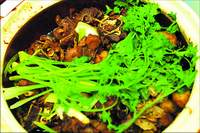
The popular Cantonese dish longhudou or "dragon duels with tiger" has been banned from dinner tables, local officials have said.
The delicacy derives its name from the snake and cat meat that, when mixed with herbs, has long been hailed as a nourishing dish in the southern metropolis.
Guo Qinghe, director of the Guangzhou bureau of forestry, reiterated over the weekend the citywide ban on the sale of snakes or foods containing the reptile.
"It is illegal for companies, restaurants and individuals to sell live snakes, snake meat and related foods," Guo said on a local TV program.
Apart from having their snakes and snake products confiscated, those caught flouting the ban will be fined between 10,000 yuan ($1,300) and 100,000 yuan, Guo added.
The Guangzhou city government banned the sale of snake and snake-related dishes in the wake of SARS in 2003, following revelations that the coronavirus might have come from snakes, civet cats and other wild animals used in Cantonese dishes.
Many restaurants subsequently resumed serving the meat when the health threat receded.
Demand for the dish peaks between September and December when snakes take on more flesh for the cold.
Many fans of the dish believe it alleviates or even cures asthma and rheumatism.
Chen Wenchong, the manager of a Cantonese restaurant in Guangzhou's Liwan district, said the snake ban had not seriously affected his business, which was well known for the dish.
The restaurant has adapted to serving mainly chicken, duck, goose and seafood, he said.
Zhou Guangjun, a Guangzhou resident, lamented the loss of the dish.
"I have stopped eating snakes but Guangzhou still has a large number of delicious dishes," Zhou told China Daily yesterday.
(China Daily via china.org.cn November 7, 2007)
